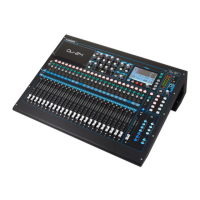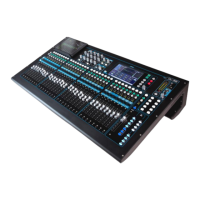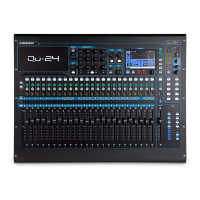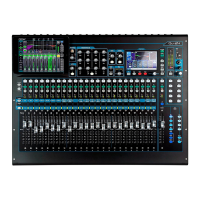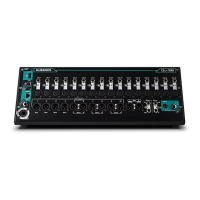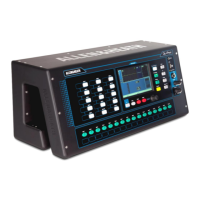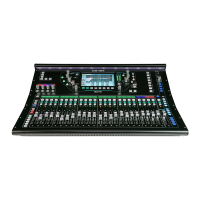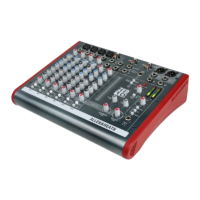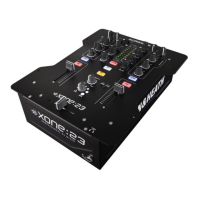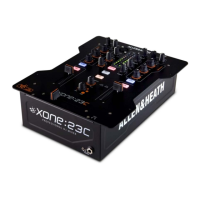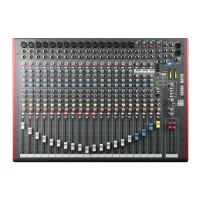Do you have a question about the ALLEN & HEATH QU-16C and is the answer not in the manual?
Details the terms and conditions that must be met for warranty coverage.
Lists optional accessories that can be purchased for the Qu-16 mixer.
Provides a general description of the Qu-16 mixer's capabilities and features.
Describes the various input connectors on the rear panel of the Qu-16.
Details the XLR and TRS balanced outputs for mixes and main LR.
Details additional connections such as Lamp, USB B, Network, and dSNAKE.
Explains how to connect the mixer to the mains power supply and the power switch operation.
Describes how to connect to AR2412 or AR84 AudioRacks using dSNAKE.
Explains how to integrate the ME-1 personal mixing system with the Qu-16.
Details the functionality and layout of the 16 fader strips on the Qu-16.
Explains the channel processing blocks like Preamp, EQ, Gate, and Compressor.
Guides users on how to access and adjust channel processing parameters via the SuperStrip and Touch Screen.
Details processing available for mix masters including EQ, Compressor, and Delay.
Explains the graphic equaliser for mix outputs, its features, and usage.
Describes how to assign and route signals from channels to mixes and FX.
Guides users on navigating and utilizing the routing assignment screens.
Explains how to assign channels to Mute Groups for simultaneous muting.
Explains how to activate Mute Groups via Home screen, Fn key, or SoftKeys.
Details the Master Strip for controlling mix masters, including meters and faders.
Explains how to adjust send levels to mixes using the faders with Mix Select keys.
Explains how to copy, paste, and reset channel processing and scene settings.
Describes the various interactive elements of the touch screen interface for mixing.
Introduces the FX screen, its layout, and rack slots for effects.
Explains how to access and load effects and presets from the FX library.
Lists and briefly describes the different types of internal effects available.
Details how to route signals to FX processors using Mix>Return, Ch>Return, and Insert methods.
Describes how to view and adjust FX parameters and their return channel EQ.
Explains how to open, navigate, and name scenes within the Scenes screen.
Covers storing, recalling, clearing, and copying scenes for mixer setup management.
Explains how to protect parameters from being overwritten when recalling scenes.
Describes how to 'safe' parameters or channels to prevent them from being overwritten by scene recalls.
Explains how to navigate setup categories and adjust screen brightness using the Dimmer control.
Details how to configure PAFL (Pre/Post Fader Listen) settings for monitoring channels.
Guides on setting up and assigning the Talkback function for communication.
Explains how to use the signal generator for testing loudspeakers and aligning levels.
Explains how to patch signals to various outputs like Qu-Drive Stereo, Alt Out, and AES Out.
Details how to patch signals from the Qu mixer to dSNAKE compatible devices.
Describes how to configure the Custom layer for fader assignments and strip labeling.
Details how to assign functions to the four SoftKeys for quick access to various operations.
Explains how to save, load, and manage mixer settings (Shows) via a USB device.
Explains how to configure network settings, including IP address, for remote control.
Guides on calibrating the touch screen and motor faders for accurate operation.
Details how to format USB devices for use with the Qu-Drive for recording and playback.
Provides instructions on how to update the Qu mixer's operating firmware.
Explains how to perform a 'reset mix settings' to return the mixer to a starting point for mixing.
Describes how to perform a complete system reset, clearing all settings, scenes, and libraries.
Lists detailed technical specifications for all input types of the Qu-16.
Lists detailed technical specifications for all output types of the Qu-16.
Details the technical specifications for USB audio connectivity and formats.
Provides system-level specifications including dynamic range, noise, and frequency response.
Specifies the physical dimensions and weight of the Qu-16 mixer.
Presents a visual block diagram illustrating the signal flow and architecture of the Qu-16.
Provides information on installation, ventilation, and rack mounting options for the mixer.
Explains the methods for registering the product online or via post.
Outlines the benefits of registering, including technical support and product news.
Lists the information required for completing the product registration form.
| Brand | ALLEN & HEATH |
|---|---|
| Model | QU-16C |
| Category | Music Mixer |
| Language | English |
